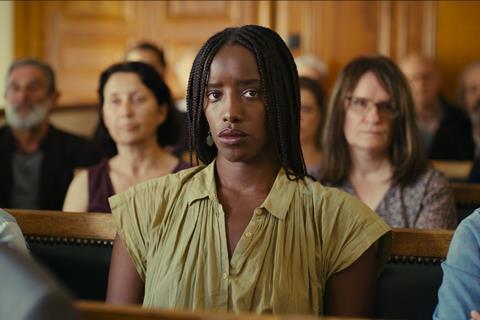Alice Diop’s fiction debut uses a real-life courtroom drama to challenge media assumptions

Dir: Alice Diop. France. 2022. 123 mins.
The first fiction feature from documentary director Alice Diop is a powerful and personal work – a subdued but intriguing portrait of a monstrous mother and the woman who struggles to understand her, which should build on the critical success of Diop’s last film, the award-winning We. There’s a combination of humane sensitivity and intellectual agility at play in this story of a young female novelist, Rama (Kayije Kagame), who attends the trial of Laurence (Guslagie Malanda), a woman accused of the murder of her 15-month-old daughter. Laurence, a highly educated and eloquent Senegalese immigrant, admits to abandoning the child on the beach, to be swept away by the rising tide. However, the question of why she did it seems to elude everyone attending the trial at the court of Saint Omer in north east France, including the accused.
Multi-layered and knottily complicated
After its world premiere in Competition at Venice, Saint Omer looks set to become a popular title on the festival circuit with screenings at TIFF, the New York Film Festival and the BFI London Film Festival booked already. And it will almost certainly generate interest with distributors in the market for distinctive female voices and fresh perspectives on the stories of people of colour, especially given it’s such a personal work – the film was closely inspired by a real-life case and a trial which Diop herself attended.
Diop was both fascinated and repelled by the horror of the crime but also recognised something in the accused woman, a Senegalese immigrand named Fabienne Kabou. They were the same age, of the same ethnic background. In the film Rama, who – like Diop at the time – is pregnant, takes the role of observer, processing the trial but also acting as a prism which deflects and fractures the prevailing media presentation of the case. Rama begins to question her own assumptions but, more so, those of the press covering the trial.
In Laurence – a fictional character based on Kabou – Diop presents us with a thorny and complex woman who doesn’t fit into the victim narrative which is frequently superimposed onto the female African immigrant. Diop cleverly nods to the idea that this academically brilliant young woman, with her precise and ornamental French, becomes almost invisible once she reaches France – the colour palette of the courtroom wood panelling, the choice of Laurence’s tobacco brown top: it all harmonises with her skin tone so that she appears to blend in with the background.
The use of haunting, sometimes discordant acapella music on the score emphasises the fact that this is a story of human connections – connections which, like that of Rama and her mother, are not always in harmony. It’s a film which is driven by two interesting, unexpected performances. Although her role is mainly as a watcher, there is nothing passive about Kagame’s Rama – she’s a woman who carries wisdom and sadness with her in every scene. And Malanda brings an unnerving poise and eloquence to Laurence. There’s an extraordinary, chilling moment when their eyes link across the courtroom; there is a spark of connection and, at the same time, a rejection. In common with much of the film, the moment, which at first seems simple, is in fact multi-layered and knottily complicated.
Production company: Srab Films
International sales: Wild Bunch International feripret@wbinter.eu
Producers: Toufik Ayadi, Christophe Barral
Screenplay: Alice Diop, Amrita David, Marie NDiaye
Cinematography: Claire Mathon
Production design: Anna Le Mouel
Editing: Amrita David
Music: Thibault Deboaisne
Main cast: Kayije Kagame, Guslagie Malanda, Valérie Dréville, Aurélia Petit
























